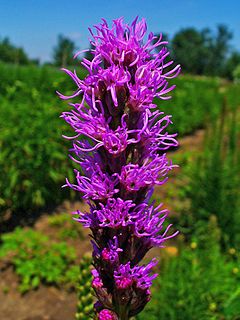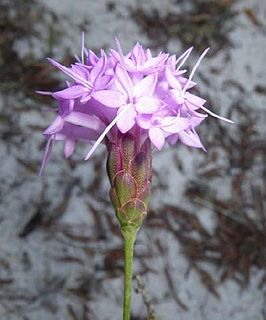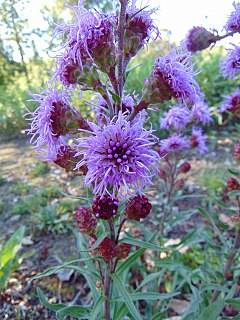
Liatris is a genus of flowering plants in the boneset tribe within the sunflower family native to North America. Its most common name is blazing star. Some species are used as ornamental plants, sometimes in flower bouquets.

A calcareous glade is a type of ecological community that is found in the central eastern United States. Calcareous glades occur where bedrock such as limestone occurs near or at the surface, and have very shallow and little soil development. Because of the shallow soil and the extreme conditions created by it, trees are often unable to grow in the glades. This creates a habitat that is usually sunny, dry, and hot. Calcareous glade vegetation is more similar to that of a desert habitat than a grassland, being dominated by small spring annuals with occasional geophytic or succulent perennials.

Liatris pycnostachya, the prairie blazing star or cattail blazing star, is a perennial plant native to the tallgrass prairies of the central United States.

Liatris spicata, the dense blazing star or prairie gay feather, is an herbaceous perennial flowering plant in the sunflower and daisy family Asteraceae. It is native to eastern North America where it grows in moist prairies and sedge meadows.
Liatris acidota, also known as the Gulf Coast gayfeather, sharp blazing star and sharp gayfeather, is a plant species in the aster family Asteraceae and genus Liatris. It is native to Louisiana and Texas in the United States, where it is found in habitats that include coastal prairies, dry prairie and savanna, where it is found in sandy to clay soils.
Liatris bracteata, commonly known as the bracted blazing star, or South Texas gayfeather, is a species of flowering plant in the aster family, Asteraceae. It is native to Texas in the United States, where it is found in coastal prairies, roadsides, and along railroads with clay or sandy loam soils. This species is of conservation concern in its native range.

Liatris chapmanii, also known as Chapman's blazing star or Chapman's gayfeather, is a plant species in the aster family Asteraceae and genus Liatris. It is native to Alabama, Florida and Georgia in the United States, where it is found in habitats such as dunes, beach strands, sand ridges, fields and roadsides, it also grows in longleaf pine savannas and other scrub habitats.
Liatris cokeri, also known as Coker's gayfeather and sandhills blazing star, is a plant species in the aster family Asteraceae and genus Liatris. It is native to North and South Carolina in the United States, where it is found in habitats such as sand ridges and sandy fields to roadsides; it is also found in turkey-oak and longleaf pine-oak plant communities. It blooms in late summer with purple flower heads.

Liatris compacta, sometimes called Arkansas gayfeather, is a herbaceous plant species in the sunflower family and genus Liatris. It is native to the Ouachitas of west-central Arkansas and eastern Oklahoma in the central United States, where it is found growing in habitats such as rocky ridges, bluffs, hillsides, weathered sandstone, and open woods. It blooms in June to September and may start blooming as early as May, it has purple flowers grouped into heads. It was known as a variety of Liatris squarrosa as Liatris squarrosa var. compacta until relatively recently.

Liatris cylindracea is a plant species in the aster family. It is native to eastern North America, where its populations are concentrated in the Midwestern United States. It is found in habitats such as prairies, limestone and sandstone outcroppings, bluffs, barrens, glades, woodlands and dunes.
Liatris cymosa, also known as Aggie-land gayfeather or branched blazing star, is a plant species in the aster family Asteraceae and genus Liatris. It is native to east central Texas in North America, where it is found in habitats such as post oak woodlands, fields, fence rows, woodland openings and edges, in clay soils. It blooms in mid to late summer with purple flower heads. It is of conservation concern.

Liatris elegans, known commonly as pinkscale gayfeather, pinkscale blazingstar, and elegant blazingstar, is a species of flowering plant in the aster family, Asteraceae. It is native to the southeastern United States as far west as Texas and Oklahoma.

Liatris helleri is a species of flowering plants in the aster family known by the common names Heller's blazing star and Heller's gayfeather. It is native to the Appalachian Mountains of the southeastern United States, found in the states of North Carolina, Virginia, West Virginia, and Maryland. It is threatened by recreational activities in its habitat, and is federally listed as a threatened species.

Liatris ohlingerae is a rare species of flowering plant in the aster family known by the common names Florida blazing star, Florida gayfeather, scrub blazing star, and sandtorch. It is endemic to Florida in the United States, where it occurs only on the Lake Wales Ridge along with many other rare plants. It is threatened by the loss and degradation of its habitat, and it is federally listed as an endangered species.

Liatris punctata is a species of flowering plant in the aster family known by the common names dotted gayfeather, dotted blazingstar, and narrow-leaved blazingstar. It is native to North America, where it occurs throughout the plains of central Canada, the central United States, and northern Mexico.

Liatris provincialis is a species of flowering plant in the aster family known by the common names Godfrey's blazing star and Godfrey's gayflower. It is endemic to Florida in the United States, where it is limited to Wakulla and Franklin Counties in the Panhandle.

Liatris squarrosa, commonly called the scaly blazingstar, is an herbaceous perennial plant native to eastern and central North America, with most populations in the Southeastern United States. It is a somewhat conservative species, often found in dry or rocky areas of native prairie and savanna vegetation. It produces purple flowerheads in the summer.

Liatris squarrulosa, commonly called Appalachian blazing star or southern blazingstar, is an herbaceous perennial plant is the aster family. It is native to the Southeastern United States where it is found in naturally open communities, such as prairies and savannas.
Liatris lancifolia is a species of flowering plants in the aster family native to the prairies of central and western North America, known by the common names lanceleaf blazing star and Great Plains gayfeather.

Liatris ligulistylis is a flowering plant of the aster family, native to the central United States and central Canada.















